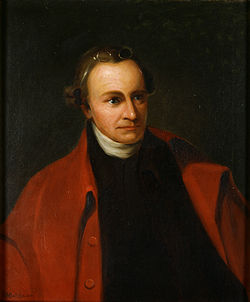Patrick Henry Quote
Related Quotes
About Patrick Henry
Patrick Henry (May 29, 1736 [O.S. May 18, 1736] – June 6, 1799) was an American politician, planter and orator who declared to the Second Virginia Convention (1775): "Give me liberty or give me death!" A Founding Father, he served as the first and sixth post-colonial governor of Virginia, from 1776 to 1779 and from 1784 to 1786.
A native of Hanover County, Virginia, Henry was primarily educated at home. After an unsuccessful venture running a store, as well as assisting his father-in-law at Hanover Tavern, he became a lawyer through self-study. Beginning his practice in 1760, Henry soon became prominent through his victory in the Parson's Cause against the Anglican clergy. He was elected to the Virginia House of Burgesses, where he quickly became notable for his inflammatory rhetoric against the Stamp Act 1765.
In 1774, Henry served as a delegate to the First Continental Congress where he signed the Petition to the King, which he helped to draft, and the Continental Association. He gained further popularity among the people of Virginia, both through his oratory at the convention and by marching troops towards the colonial capital of Williamsburg after the Gunpowder Incident until the munitions seized by the royal government were paid for. Henry urged independence, and when the Fifth Virginia Convention endorsed this in 1776, he served on the committee charged with drafting the Virginia Declaration of Rights and the original Virginia Constitution. Henry was promptly elected governor under the new charter and served a total of five one-year terms.
After leaving the governorship in 1779, Henry served in the Virginia House of Delegates until he began his last two terms as governor in 1784. The actions of the national government under the Articles of Confederation made Henry fear a strong federal government, and he declined appointment as a delegate to the 1787 Constitutional Convention. He actively opposed the ratification of the United States Constitution, both fearing a powerful central government and because there was as yet no Bill of Rights. He returned to the practice of law in his final years, declining several offices under the federal government. A slaveholder throughout his adult life, he hoped to see the institution end but had no plan beyond ending the importation of slaves. Henry is remembered for his oratory and as an enthusiastic promoter of the fight for independence.
A native of Hanover County, Virginia, Henry was primarily educated at home. After an unsuccessful venture running a store, as well as assisting his father-in-law at Hanover Tavern, he became a lawyer through self-study. Beginning his practice in 1760, Henry soon became prominent through his victory in the Parson's Cause against the Anglican clergy. He was elected to the Virginia House of Burgesses, where he quickly became notable for his inflammatory rhetoric against the Stamp Act 1765.
In 1774, Henry served as a delegate to the First Continental Congress where he signed the Petition to the King, which he helped to draft, and the Continental Association. He gained further popularity among the people of Virginia, both through his oratory at the convention and by marching troops towards the colonial capital of Williamsburg after the Gunpowder Incident until the munitions seized by the royal government were paid for. Henry urged independence, and when the Fifth Virginia Convention endorsed this in 1776, he served on the committee charged with drafting the Virginia Declaration of Rights and the original Virginia Constitution. Henry was promptly elected governor under the new charter and served a total of five one-year terms.
After leaving the governorship in 1779, Henry served in the Virginia House of Delegates until he began his last two terms as governor in 1784. The actions of the national government under the Articles of Confederation made Henry fear a strong federal government, and he declined appointment as a delegate to the 1787 Constitutional Convention. He actively opposed the ratification of the United States Constitution, both fearing a powerful central government and because there was as yet no Bill of Rights. He returned to the practice of law in his final years, declining several offices under the federal government. A slaveholder throughout his adult life, he hoped to see the institution end but had no plan beyond ending the importation of slaves. Henry is remembered for his oratory and as an enthusiastic promoter of the fight for independence.
